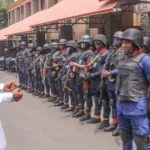Low donor numbers hamper Africa’s national blood services
A terrible car accident in late 2022 in Ghana’s southern Akuse town left Nana Serwaa Brakatuo in a critical condition. With a ruptured liver and blood clots in the lungs, doctors said her chances of survival were bleak, without timely and sufficient blood transfusion needed for her surgery. But thanks to blood donations from anonymous donors, family and friends, doctors were able to save her life.
When she was rushed into our facility, she had lost a lot of blood.
“We needed donor blood as a matter of urgency,” recalls Beatrice Mfoafo, a critical care nurse at the 37 Military Hospital in Accra, Ghana’s capital.
It took three weeks, two surgeries and 30 units of blood to set Nana Brakatuo on the road to recovery.
“Despite our expertise, she would not have survived if we didn’t get the blood she needed. The intervention from blood donors and the National Blood Service was what did the magic for her,” Mfoafo adds.
Nana Brakatuo says there are no words to express her gratitude:
“I am alive today because people voluntarily decided to donate their blood.”
African countries have made progress by establishing nationally coordinated blood transfusion services, policy frameworks and national standards for collecting, testing, processing, storing and distributing blood and blood products, according to the 2022 World Health Organization (WHO) African Region Status Report on Blood Availability, Safety and Quality.
The number of facilities accredited by the Africa Society for Blood Transfusion Step-Wise Accreditation Programme doubled between 2013 and 2020. Additionally, the number of countries with policies, legislation, national standards and guidelines for the clinical use of blood increased from 19 in 2013, to 23 in 2020.
“This confirms progressive implementation of the WHO regional strategy on regulating blood and blood products,” the report says, adding that appropriate regulatory systems are key to optimal blood quality, safety and availability.
But blood donation rates remain too low to meet the demand, with 38 African countries recording a combined shortfall of more than 3 million units of blood in 2020.
In Ghana, for example, around 180 000 blood donations were collected in 2022 – far short of the year’s target of 308 000 donations. The COVID-19 pandemic also drove down the number of voluntary blood donors in Kenya, Lesotho, Malawi and Mauritius, from more than 80% to less than 50%.
Significant challenges remain, cautions Dr Mohamed Ismail, team lead for Medicines Supply Health Infrastructure at the WHO Regional Office for Africa:
“With blood collection rates still more than five times lower than high-income countries, accessibility to all who need it remains compromised.”
Weak donor recruitment programmes, cultural resistance and lack of community education are some of the barriers to sufficient availability of blood and blood products needed to save lives, the report says. These factors are compounded by financial constraints, inappropriate clinical use of blood leading to overconsumption, and loss of blood products through a high proportion of discarded blood units, among other things.
Dr Shirley Owusu-Ofori, chief executive officer of the Ghana National Blood Service, says they are intensifying efforts to encourage daily voluntary donations, working with WHO to strengthen capacity and advocacy.
“Emergencies requiring blood cannot wait; we need blood ready all the time,” she points out.
It is the tireless commitment of donors such as Henry Nii Abossey Thompson, a Ghanaian who has donated blood 100 times since 1976, that saves the lives of patients such as Nana Brakatuo every day. Two-thirds of the donor blood used on the African continent is for internal medicine, gynaecology and paediatric patients, with severe anaemia in women following post-partum haemorrhage accounting for 70% of total blood transfusions in several African countries.
“I believe it is our collective civic responsibility to ensure that blood is readily available for all who need it,” says Thompson, adding that “it is very fulfilling to give a part of you to save the life of another person”.
Like Nana Brakatuo, 75-year-old Burundi farmer Modeste Ntahomvukiye is another recipient who owes her life to blood donors. Unconscious and anaemic and suffering from malaria when she was transferred to Prince Regent Charles Hospital in Bujumbura, her life was slipping away.
“It was a struggle to find a person whose blood type was compatible with mine,” she says, thanking the anonymous donor who saved her life back in June 2019.
For Nditifei Goni in Chad, donating blood is an act of commitment to saving lives.
Following an operation two decades ago for which he required a blood transfusion, he vowed to donate blood to those in need whenever possible.
“For me, it’s something natural. I have to give blood to save lives,” he says.





